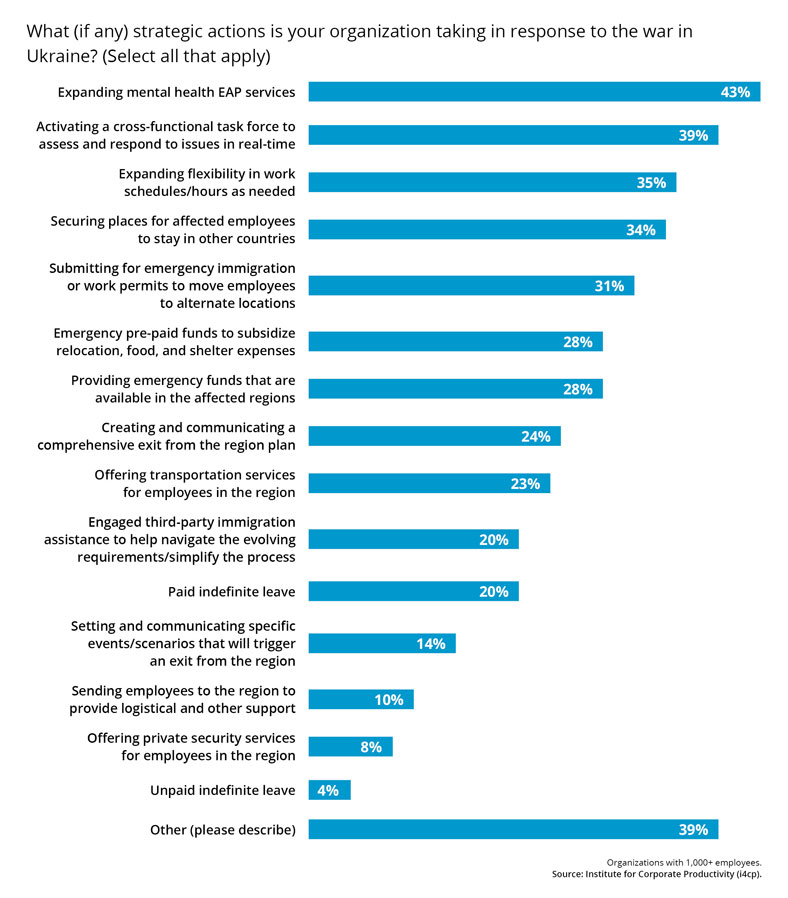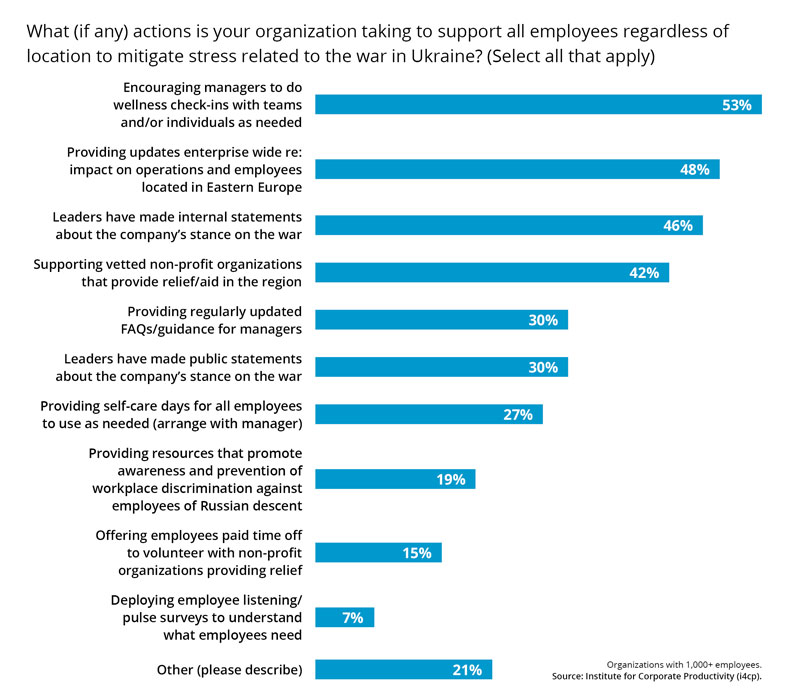How High-Performance Organizations Can Replenish Depleted Wells of Resilience

I conducted an informal poll this week of people in my social network, asking them about their sense of personal well-being and whether they’ve seen signs of strain among their co-workers.
I heard from a few that the number of sick days they and their co-workers are taking is noticeably on the rise. So too are discussions about feeling burnt out, overwhelmed, despondent, exhausted. These emotions are understandable and common.
While there was some optimism at the start of 2022 (widespread vaccination, the easing or discontinuation altogether of COVID restrictions, and the approach of springtime) the war in Ukraine has pushed many people back into psychological survival mode.
We’ve been resilient in so many ways in the past two years, but the destruction of an entire country unfolding on live TV, mass displacement of millions of Ukranians, and the threat of further escalation and destabilization of Europe has eclipsed that hopefulness.
Taking care of employee well-being remains priority-one
The Institute for Corporate Productivity (i4cp) conducted a survey this month with focus on the workforce and business impacts of the war in Ukraine and how companies are supporting their employees worldwide.
It was encouraging to note that among the actions larger organizations (those employing >1,000) are taking to help employees manage stress related to the war in Ukraine, expanding mental health and EAP services topped the list.
There’s also emphasis on reminding managers to check in on their team members, keeping communications and updates coming, and having leaders step up and make statements internally about where the organization stands on the war.
These simple actions (and more) combine to provide some degree of reassurance, and perhaps the greatest benefits of such consistent activity may simply be the acknowledgment that we are doing our best in a continuously swirling storm of stress and uncertainty. Business as usual is impossible when it seems like the world is imploding (still and again). The importance of acknowledging this cannot be overemphasized.
The prioritizing of employee mental health and emotional well-being noted in i4cp’s most recent research is supported by new data from the American Psychological Association (APA).
The APA marked the second anniversary of the declaration of the World Health Organization of COVID-19 as a global pandemic (3/11/2020) by fielding a survey to explore the impact on our collective mental health, with a focus on individuals rather than employers.
The APA’s survey analysis noted that the war in Ukraine “spurs mass fear and anxiety as U.S. adults watch in horror” and additional sources of stressors for individuals were:
- 87% Inflation; the rise in prices of everyday items (e.g., fuel and grocery costs, etc.)
- 81% Supply chain worries
- 81% Global uncertainty
- 80% Potential retaliation from Russia (e.g., cyberattacks, nuclear threats): 80%
“In addition, the survey revealed widespread grief and sense of loss, continued hardships for vulnerable populations, concerns for children’s development among parents, and entrenched, unhealthy coping habits. Money stress registered at the highest recorded level since 2015, revealed the broader poll,” the analysis noted.
The innumerable unknowns are also troubling, for example, the long- and short-term impacts of COVID on people’s health, disruptions to child development, socialization, and education, and the economy.
Foster resilience and well-being by doing what we know works
Approaching employee well-being from a holistic perspective, which i4cp defines as tending equally to the combined elements of physical and emotional/mental, financial, community, career, and social well-being, is a practice i4cp’s research has shown adopted far more by high-performance organizations.
In fact, high-performance organizations (HPOs) are 4X more likely than their lower-performing counterparts to emphasize holistic well-being and understand the effects of this on their culture and brand.
Further, our 2020 study, Next Practices in Holistic Well-Being: The Performance Advantage found that HPOs are:
- 4x more likely to emphasize social well-being
- 4x more likely to leverage champions to promote employee well-being
- 3x more likely to emphasize community well-being
- 3x more likely to have online social communities related to well-being
- 3x more likely to apply specific practices that enable individuals to help each other maintain good health habits
- 2x more likely to design well-being programs to leverage collaboration
Recommendations from the same study are based on this finding: only 15% of the 557 business professionals surveyed reported that their organizations are highly effective in addressing employees’ mental health needs, though the percentage more than doubles in high-performance firms:
With emphasis on mental/emotional health projected to grow significantly in the next few years, now is time for organizations to take decisive actions.
- Work intentionally to remove the stigma associated with talking about and seeking treatment for mental/emotional issues:
- Offer robust EAP programs that provide a variety of counseling sessions.
- Use mobile apps to speed access to mental health interventions.
- Leverage speakers, films, and other resources to open ongoing conversations about emotional well-being issues and solutions.
- Include mental health topics in content of regular internal communications.
- Try these next practices high-performance organizations apply to drive better outcomes in mental/emotional health:
- Train leaders and employees to recognize signs of mental/emotional distress in themselves and others.
- Encourage employees to report concerns about their own and colleagues’ emotional well-being.
- Urge employees to report feeling overburdened by excessive collaborative requests.
Click here for more resources related to i4cp's research on employee well-being.
Lorrie Lykins is i4cp's Vice President of Research








